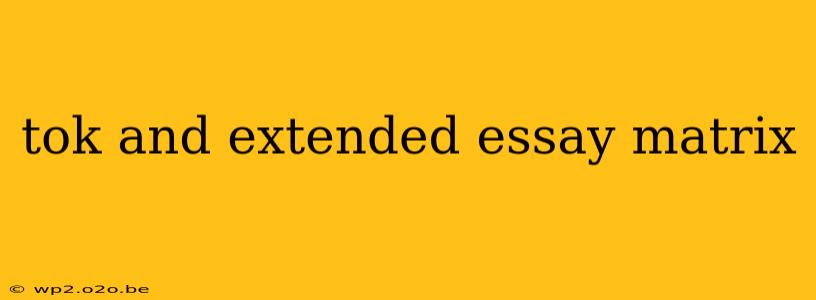The International Baccalaureate (IB) Diploma Programme presents a challenging yet rewarding journey for students. Two cornerstone components, the Theory of Knowledge (TOK) essay and the Extended Essay (EE), often feel daunting. This matrix helps you understand the interconnectedness of these assessments and strategize for success.
Understanding the Interplay: TOK and Extended Essay
Both the TOK essay and the Extended Essay are crucial for obtaining the IB Diploma. While distinct, they share underlying principles:
- Critical Thinking: Both assessments demand rigorous critical thinking skills. You'll analyze information, evaluate arguments, and formulate your own perspectives.
- Research Skills: Both require in-depth research, careful sourcing, and the ability to synthesize information from various sources.
- Communication Skills: Clear, concise, and well-structured writing is essential for success in both assessments.
- Real-World Connections: Both encourage you to explore real-world applications of your knowledge and consider the implications of your findings.
However, they differ in focus:
- TOK: Focuses on exploring knowledge itself – its nature, scope, and limitations – across various areas of knowledge. It encourages reflection on the process of knowing.
- EE: Focuses on in-depth research within a specific subject area, culminating in a substantial research paper demonstrating independent learning and research skills.
The TOK and Extended Essay Matrix: A Practical Guide
This matrix outlines how to connect your TOK essay and Extended Essay for a more cohesive and impactful IB experience.
| Aspect | TOK Essay | Extended Essay | Interconnection |
|---|---|---|---|
| Focus | Knowledge, its nature, and its limitations | In-depth research in a specific subject area | Your EE's subject area can provide a concrete example for your TOK essay's arguments. |
| Methodology | Philosophical analysis, reasoned argumentation | Research methods specific to the chosen subject | Your EE's research process can inform your TOK reflections on the reliability of knowledge. |
| Knowledge Claims | Examination of knowledge claims from various perspectives | Development of a central research question and supporting claims | The claims made in your EE can be analyzed in relation to broader epistemological questions in your TOK essay. |
| Areas of Knowledge | Draws from various Areas of Knowledge (e.g., Natural Sciences, Human Sciences, Ethics) | Concentrates within one Area of Knowledge | Your EE subject's AoK provides a specific lens through which to explore your TOK themes. |
| Ways of Knowing | Explores different Ways of Knowing (e.g., reason, emotion, sense perception) | Utilizes specific Ways of Knowing relevant to the subject | Your EE’s reliance on certain WoKs can be examined within the context of their reliability and limitations in your TOK essay. |
| Assessment | Evaluated on the quality of argumentation, critical thinking, and clarity of expression | Evaluated on research, analysis, and communication | A strong EE can support and exemplify arguments made in your TOK essay. |
Strategic Planning: Linking TOK and EE
- Subject Choice: Select an Extended Essay topic that resonates with your interests and allows you to explore a specific area of knowledge relevant to your TOK essay's focus.
- Research Alignment: Align your EE's research methods with relevant Ways of Knowing explored in your TOK essay.
- Knowledge Questions: Consider formulating a knowledge question for your EE that directly relates to a broader knowledge question addressed in your TOK essay.
- Reflection: Reflect on the limitations of your EE's methodology and the implications of your findings for your TOK essay's arguments.
- Integration: Subtly and strategically weave connections between your EE and your TOK essay, avoiding direct repetition but highlighting the synergies between your work.
By strategically linking your TOK essay and Extended Essay, you not only strengthen your understanding of the IB Diploma Programme's core requirements but also create a more coherent and impactful learning experience. Remember that a strong understanding of both assessments is crucial for success in the IB Diploma Programme. Careful planning and thoughtful reflection will lead to a more successful and rewarding experience.

